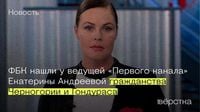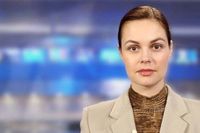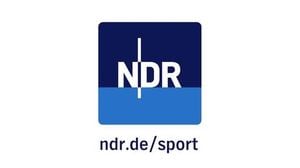A new investigation has revealed that Ekaterina Andreeva, a prominent Russian television presenter known for her pro-Kremlin propaganda on Russia's First Channel, holds citizenship in both Montenegro and Honduras. This dual citizenship allows her to travel freely across Europe, even amid the ongoing war in Ukraine. The findings were disclosed by the Anti-Corruption Foundation (FBK), founded by the late Russian opposition leader Alexei Navalny.
Andreeva, who has been a fixture on Russian television since 1997, is not only a Russian citizen but also possesses passports from these two countries. The Montenegrin passport grants her visa-free access to more than 130 nations, including several European Union member states. This privilege has been utilized by Andreeva, enabling her to visit various countries, including those considered "unfriendly" towards Russia.
Despite the escalation of military conflict following Russia's full-scale invasion of Ukraine, Andreeva has reportedly traveled to countries such as Finland, Norway, and Montenegro. The investigators noted that her travel patterns suggest she often departs Russia immediately after her work shifts, indicating a deliberate effort to evade the consequences of her public persona.
According to the investigation, Andreeva received her Montenegrin citizenship in 2011, a status granted for "special services to the country." Local media reports suggest that this honorary citizenship is awarded in exceptional circumstances, specifically to individuals whose professions significantly benefit Montenegro's scientific, cultural, or economic interests.
Her Honduran citizenship, however, dates back to 2005 and was reportedly facilitated by her husband, Dusko Perovic, who is the head of the representative office of the Republic of Serbian in Russia. While details surrounding the issuance of his Honduran passport remain unclear, it is known that Andreeva's Honduran passport was publicly acknowledged in 2004.
The FBK has expressed concern over Andreeva's ability to travel freely, especially as she is listed on several international sanctions lists due to her support for Russian military actions. In 2014, she was sanctioned for her backing of Russia's aggression in Ukraine and the annexation of Crimea. More recently, she was added to Canada's sanctions list in July 2022 and Ukraine's list in October of the same year, further solidifying her status as a prominent figure in the Kremlin's propaganda efforts.
In response to these revelations, the FBK has called for the Montenegrin authorities to revoke Andreeva's citizenship. According to Vyacheslav Gimadi, a legal representative of the foundation, the law stipulates that Montenegrin citizenship can be terminated if the actions of a "specially important citizen" jeopardize the vital interests of the country. Maria Pevchikh, a spokeswoman for the FBK, stated, "Today, a demand has been written to the government of Montenegro to deprive Ekaterina Andreeva of honorary citizenship. It is not clear for what services it was issued, and now there are absolutely no reasons left. Well, why does Putin's chief propagandist need a NATO country passport?"
Andreeva's influence as a media figure has been significant, and her unwavering support for the Russian government has made her a key player in the dissemination of state propaganda. Her regular appearances on the Vremya news program have solidified her position as a trusted voice for the Kremlin, despite international condemnation of Russia's actions in Ukraine.
As the conflict in Ukraine continues, the implications of Andreeva's dual citizenship raise questions about the accountability of individuals who promote state propaganda while enjoying the freedoms afforded by foreign citizenship. Her travels to countries that have imposed sanctions on Russia highlight a troubling contradiction between her public persona and private privileges.
Moreover, the investigation's findings come at a time when Russian authorities are intensifying their crackdown on dissent and increasing scrutiny of citizens who oppose the war. This scrutiny has extended to the media, where journalists and presenters who express anti-war sentiments face severe repercussions. In stark contrast, figures like Andreeva, who align themselves with the government narrative, enjoy the benefits of international travel and recognition.
The revelations about Andreeva's citizenship also coincide with broader discussions about the role of media in shaping public perception during times of conflict. As the war in Ukraine unfolds, the importance of independent journalism and the need for accountability among media figures has never been more pronounced.
In recent months, there have been calls from various quarters for a reevaluation of the relationship between citizenship and the responsibilities that come with it, particularly for those who wield significant influence in public discourse. The FBK's efforts to challenge Andreeva's citizenship status reflect a growing demand for accountability among those who promote narratives that contribute to conflict and division.
As the situation develops, the implications of Andreeva's case may extend beyond her individual circumstances, potentially influencing discussions about citizenship, accountability, and the responsibilities of public figures in a time of war. The ongoing scrutiny of her actions and the calls for her citizenship revocation underscore the complexities of navigating national identity amid geopolitical tensions.
In conclusion, the investigation into Ekaterina Andreeva's citizenship status serves as a poignant reminder of the intertwining of media, politics, and personal privilege in the context of international conflict. As the war in Ukraine continues, the role of propagandists and their ability to traverse borders with relative ease raises critical questions about the ethics of citizenship and the responsibilities of those who shape public narratives.







